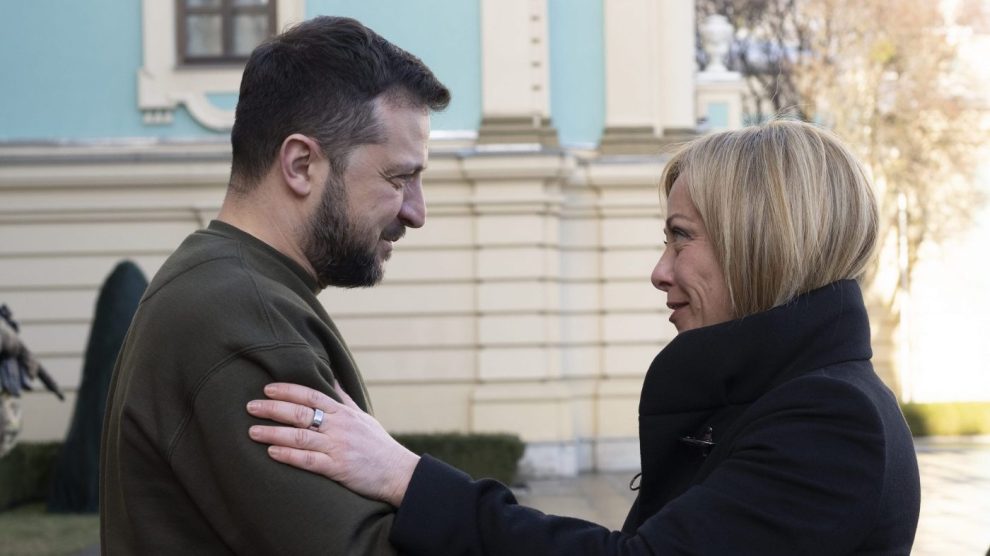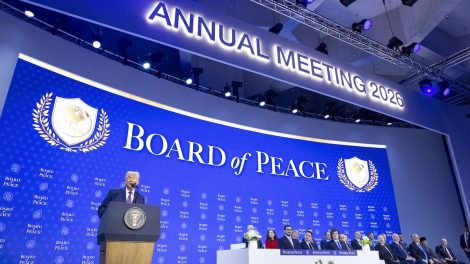Giorgia Meloni’s Ukraine visit. The Italian Prime Minister travelled to Kyiv to meet with President Zelensky and manifest Italy’s steadfast support for its resistance against Russia. “Italy does not intend to waver and will not do so,” she said alongside the Ukrainian President during the ensuing presser.
- Rome, she promised, “will give every possible assistance so that the conditions for negotiations can be created, but until then, it will give every kind of military, financial and civil support”, stressing that “whoever is supporting Ukraine, even militarily, is working for peace.”
- She also said she’d try to communicate the Ukrainian struggle back home to explain why “it is impossible to turn away. It would also be very stupid to do so. Not only because there is an attacked people, but because Ukrainian interests coincide with those of Europe” and the free world at large.
- Finally, PM Meloni declared that Italy – as we anticipated – will host a reconstruction conference in April. “There is know-how that Italian companies can offer; we will make it available because Italy wants to play a leading role” in reconstruction efforts.
Propaganda and reality checks. In the morning, PM Meloni visited Irpin and Bucha – where Russian soldiers carried out an infamous massacre – to pay homage to the victims in the mass graves. Meanwhile, Russian President Vladimir Putin voiced his speech at the Federal Assembly in Moscow.
- “A part of me hoped he would say different words, expecting a step forward. What we heard this morning is the usual propaganda, but the facts are different,” she told journalists.
- The Russian leader “said he is working for diplomacy to avoid conflict, but the truth is that there is someone who is the invader and someone who is defending himself. And the paradox is that those who are the victims of this aggression are nevertheless trying to present a peace plan.”
- As he spoke, the czar also made an attempt to curry Italy’s favour. “Russia knows how to be a friend and keep its word. This is demonstrated by our help to European countries, such as Italy, during the most difficult time of the Covid pandemic.”
- “I don’t know if [that] was a warning,” replied PM Meloni during the presser, “but I can say that Covid was another world: nothing is the same since 24 February 2022.”
Acknowledging Holodomor. Meanwhile, back in Italy, the Lower House’s Foreign Affairs Committee unanimously voted to recognise the Holodomor as a genocide perpetrated by the Soviet Union against the Ukrainian people in the early 1930s – an important signal from Rome to Kyiv, especially in light of the upcoming strengthening of military support.
- The document commits the government “to officially recognise the Holodomor as a genocide, adopting every consequent initiative, in agreement with the Parliament of the Italian Republic and with the multilateral institutions of which Italy is part, for the promotion in Italy and abroad of the awareness and remembrance of that tragedy.”
Lastly, Silvio Berlusconi. When a journalist brought up the pro-Putin tirade expressed by the head of Forza Italia, a governing party, PM Meloni stressed that whenever MPs were called to vote on matters concerning Ukraine, all majority parties always fell in line. “There is a clearly aligned programme, everyone has always respected it, and I trust that it will still be so.”
- Also, President Zelensky pushed back against Mr Berlusconi’s negative words about him. “I believe that [Mr] Berlusconi’s house has never been bombed, never have tanks arrived in his garden, no one has killed his relatives, he has never had to pack his suitcase at 3 AM to escape – and all this thanks to Russia’s brotherly love.”
Biden speaking. Earlier in the day, PM Meloni also spoke over the phone with United States President Joe Biden, who had visited Kyiv on Monday and invited her to the White House, stating he “looks forward to welcoming her to Washington.”
Taking stock of Italy’s aid so far. Foreign Minister Antonio Tajani reiterated that Italy would continue supplying Ukraine with arms. “We have already approved the sixth package, and the sending of the material is being finalised. In a few weeks, in cooperation with the French, we will also send the SAMP/T missile system for air defence to Ukraine,” he told La Stampa.
- This latter system is slated to be delivered “in the coming weeks,” as Foreign Minister Antonio Tajani announced, as Italy and France – who supply its parts – need to overcome a technical alignment problem. Nevertheless, while in Kyiv, PM Meloni highlighted that Rome and Paris are working “with great speed.”
Seventh package incoming. As revealed by Corriere della Sera, PM Meloni’s government is drafting the seventh decree to provide more aid to Kyiv. “We have just passed the [sixth] decree, and more requests have come from Ukraine. We will have to make another one,” said Defence Minister Guido Crosetto, reportedly, to a government colleague.
- Nevertheless, Italian government representatives told the newspaper that the seventh aid package “will [contain] a different kind of weaponry.” There is talk of a new batch of drones – “which have a market somewhere between military and civil” – and even long-range missiles.
Jets “off the table” – for now. There have also been rumours regarding what fighter aircrafts Italy may be able to provide Kyiv with, although PM Meloni noted that the matter is “off the table” for the time being, as it’s a decision Italy must make alongside international partners.
-
- FM Tajani acknowledged compatibility and training issues with the Italian fleet and Ukrainian pilots.
- “It depends on which ones. The F-35s are out of the question, [but] we can start a discussion on AMX fighter bombers. We will listen to Ukrainian demands,” said Deputy Foreign Minister Edmondo Cirielli to Il Messaggero.
All weapons are defensive when being attacked. If confirmed, longer-range missiles would still be a major upgrade as “until now, to avoid involvement in the conflict, NATO countries had placed limitations on the allocation of certain armaments,” as noted by Mr Cirielli. Also, it would overcome the formula used so far by Rome – defensive weapons only – to placate sectors of the majority and pieces of public opinion less favourable to sending weapons. “When there is aggression, all weapons provided are defensive,” quipped PM Meloni during the presser.”





